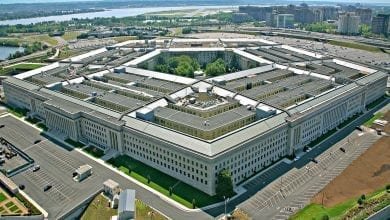Contradictory Reports Obscure Iran’s Role In Hamas’ Deadly Attack — That’s Exactly How Tehran Likes It

- There isn’t enough information to confirm that Iran took charge of the Oct. 7 surprise terrorist attack on Israel, and Iran likely wants it to stay that way.
- Nevertheless, Iran has a longrunning plan to empower proxies, including Hamas, to carry out foreign policy objectives that correspond to Tehran’s, experts said.
- Iran is “empowering someone who would be shooting at that adversary anyway,” Behnam Ben Taleblu, a senior fellow at the Foundation for Defense of Democracies, told the Daily Caller News Foundation.
Contradictory reports obscure Iran’s role in the Oct. 7 Hamas attacks on Israel despite its policy of arming proxy militias in the Middle East, but that’s exactly how Iran wants it to be, an expert told the Daily Caller News Foundation.
Questions swirled in the aftermath of Hamas’ surprise attack on Israel regarding how much responsibility Tehran’s Islamic Revolutionary Guard Corps (IRGC), the organization through which Iranian Ayatollah Ali Khamenei carries out some foreign policy aims, bears for the attacks. The IRGC has long engaged in arming and funding Hamas and Tehran stands to benefit from the conflict, but there is no clear evidence indicating that Tehran orchestrated or ordered the attacks, experts said.
“Iran’s proxy strategy is predicated on a local actor in a local conflict against an Iranian adversary, where the Islamic Republic benefits from the local actor being empowered to shoot against Tehran’s adversary,” Behnam Ben Taleblu, a senior fellow at the Foundation for Defense of Democracies, told the DCNF. “In this case, the real nature of the relationship with Hamas is somewhere in between ‘set it and forget it’ and ‘manage it.’”
The entire point of Iran’s proxy strategy, Taleblu said, is to minimize opportunities for attribution while “empowering someone who would be shooting at that adversary anyway.”
Hamas and Iran share the same goal to destroy Israel, Taleblu explained.
Immediately after the attack, many experts and politicians pinned ultimate blame on Iran for instigating the attacks. But media reports are conflicting, and the sources on which they depend are not always the most reliable.
The U.S. and Israel have reiterated they do not possess intelligence suggesting Iran knew about or helped plan the attack. Iran’s Supreme Leader, Ayatollah Khamenei, has also denied a role in the attack but praised the aggressors for advancing the elimination of Israel.
“Iran is complicit in this attack in a broad sense because they have provided the lion’s share of the funding for the military wing of Hamas, they have provided training, they have provided capabilities, they have provided support, and they have had engagement and contact with Hamas over years and years. And all of that has played a role in contributing to what we have seen,” National Security Adviser Jake Sullivan said at an Oct. 10 briefing.
“Now, as to the question of whether Iran knew about this attack in advance or helped plan or direct this attack, we do not — as of the moment I’m standing here at the podium — have confirmation of that,” Sullivan said.
White House officials have not changed their stance at the time of posting. Taleblu said that Washington will be looking for evidence but is unlikely to find it.
Accounts from anonymous sources familiar with certain events differ from what officials have said publicly.
The Monday before the attack, Iran greenlighted the operation, the Wall Street Journal reported, citing unnamed senior members of Hamas and Hezbollah — a Lebanese terrorist political-military organization that also receives significant support from Tehran. The Wall Street Journal also cited a European official and an adviser to the Syrian regime. Since August, IRGC officers had coordinated with the two groups at meetings in Beirut to devise the multidomain attack, the people reportedly said.
Iranian Foreign Minister Hossein Amir-Abdollahian attended two meetings since August, people representing the group said.
A U.S. official told the WSJ that the U.S. did not ” have any information at this time to corroborate this account.” Israel’s ambassador to the United Nations, Gilad Erdan, acknowledged that Iran attempts to coordinate activities as much as possible and entertains frequent meetings with representatives of its proxies in the region.
Iran appears to run a joint operations center, either virtual or based in Beirut, to share intelligence with regional proxies including Hamas and Hezbollah during times of escalation, according to Foreign Policy, citing local media and officials.
However, Mahmoud Mirdawi, a senior Hamas official, attributed the planning to Hamas alone, according to the WSJ. “This is a Palestinian and Hamas decision,” he said. A spokesperson for Iran’s mission to the United Nations, the closest thing to an Iranian embassy in the U.S., also reiterated Hamas’ unassisted planning of the attacks.
Gen. Esmail Ghaani, who supervises Iran’s proxy operations as head of the IRGC’s elite Quds Force, met several times with Hamas and Hezbollah in Lebanon over the past year, according to a report from the New York Times days later, citing five Iranians familiar with the IRGC’s activities. Hezbollah leader Hassan Nasrallah also held a high-level strategy meeting with representatives from many Iranian proxy groups telling them to prepare for an unprecedented war with Israel, two participants told the outlet.
But their stories diverged regarding whether the events directly pertained to Hamas’ Oct. 7 attack.
U.S. intelligence agencies have collected pieces of intelligence that seem to indicate the attacks took Iran by surprise, the NYT reported.
But a Hamas official said the group had been planning the operation for two years, CNN reported.
“First and foremost, it is Iran that gives us money and weapons, “Ali Baraka, head of Hamas National Relations Abroad, told a Russian news agency, according to CNN. He did not indicate external involvement in the attack.
Iran provides about $100 million in combined support to Hamas and other Palestinian terrorist groups each year, according to a 2020 State Department estimate.
“Since Hamas took over de facto control of the Gaza Strip in 2007, it has engaged in several rounds of conflict with Israel, with continued reported material and financial support, but uncertain direction, from Iran,” the Congressional Research Service said in a report published on Oct. 13.
“Iran initially smuggled rockets into Gaza by sea and via illicit tunnels under the Egyptian border,” said the Congressional Research Service report. “After Egypt began cracking down on those tunnels in 2013, and as ties between Iran and Sudan (a key arms transit point) began to deteriorate in 2014, Iran focused more on teaching Palestinian militants how to use Iranian systems and locally manufacture their own variants.”
“Hamas’ tunnel infrastructure is still massive despite Israel and Egypt regularly degrading it,” Bilal Saab, senior fellow and director of the Defense and Security Program at the Middle East Institute (MEI) in Washington, told CNN.
“Iran has also been shipping Hamas its more advanced … ballistic missiles via sea, in components for construction in Gaza,” Charles Lister, also a senior fellow at MEI, told CNN. Hamas members have received training in Iran on how to build their own rockets as well as operate Iranian weapons, Lister added.
A Hamas official has boasted about operating local factories for various kinds of rockets, mortars and ammunition as well as Russian Kalashnikovs and their bullets, according to CNN.
“Instead of giving them a fish or teaching them to catch a fish, we taught our allies and friends how to make a hook, and they are now in possession of missile capabilities and technologies,” IRGC Aerospace Division commander General Amir Ali Hajizadeh, said in a 2021 interview.
Developments of the Hamas-Israel war indicate Iran’s cooperation with Hamas has only deepened.
Hamas forces intruded into Israel on Saturday, Oct. 7, along six lines of attack in three domains — air, land and sea — displaying complex tactics and operational planning that suggested Hamas forces were trained by outside powers, namely the IRGC, experts said. U.S. officials are investigating whether the IRGC trained Hamas militants in sophisticated tactics like those seen Saturday, NBC News reported.
“Such complex military planning speaks for itself. It is a smoking gun as regards the involvement of the Iranian Revolutionary Guards,” Can Kasapoğlu, a senior fellow at Hudson Institute, said in a statement shared with the DCNF.
Iran has called for de-escalation and hyped warnings that the conflict will soon reach a point where it becomes inevitable conflict will spill into Lebanon.
Biden said the U.S. has “made it clear” to Iran it should “be careful” to avoid kinetic involvement in the hostilities against Israel, Axios reported on Oct. 11.
Iran has incentive to gloat about the attacks, which humiliated Jerusalem and exposed new weaknesses, but at the same time it wants to cover up any evidence of involvement to avoid becoming the next military target, Taleblu told the DCNF.
At the same time, however, the escalation-averse Biden Administration may demonstrate “a hesitancy to connect the dots … or to point a finger at the actor who benefits most,” he said. “That’s clearly the Islamic Republic of Iran, and that’s because Washington has a disjointed strategy towards terrorist proxies and the terror patrons.”
Content created by The Daily Caller News Foundation is available without charge to any eligible news publisher that can provide a large audience. For licensing opportunities of our original content, please contact licensing@dailycallernewsfoundation.org




